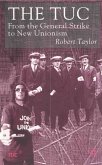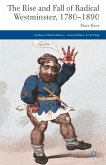Robert Taylor examines some of the most important personalities and events that shaped the Trades Union Congress during the twentieth century, from the General Strike of 1926 to the New Unionism of the 1990s. The study includes portraits of Walter Citrine, founder of the modern TUC, as well as Ernest Bevin, Arthur Deaking, Frank Cousins, George Woodcock, Vic Feather, Jack Jones, Len Murray, Norman Willis and John Monks.
Hinweis: Dieser Artikel kann nur an eine deutsche Lieferadresse ausgeliefert werden.
Hinweis: Dieser Artikel kann nur an eine deutsche Lieferadresse ausgeliefert werden.
'...unlikely to be bettered.' - Paul Routledge, New Statesman
'Robert Taylor has achieved something unprecedented in the annals of trade union historiography. He has written a readable book on the TUC.' - Denis MacShane, Prospect
'Robert Taylor's chosen method of telling that story largely through the leading personalities is a shrewd formula. His narrative puts all the giants of the trade union movement on stage.' - Geoffrey Goodman, UCATT Building Worker
'One has only to read and re-read Taylor's gripping account of the battles over In Place of Strife to realize what opportunities were lost in the late 'sixties, and maybe the 'seventies, to re-develop trade unionism.' - Geoffrey Goodman, IPMS Bulletin
'The brothers who recently assembled for their 132nd Congress in Glasgow may well have longed to be rewarded with a more inspiring, or even encouraging, tale. Yet they could hardly have hoped for a better balanced ore more informative one.' - Anthony Howard, Sunday Times
'...a refreshing reminder of the contribution made to cililisation by some of the leading figures of this other - much maligned - institution.' - Jimmy Burns, The Tablet
'Robert Taylor has achieved something unprecedented in the annals of trade union historiography. He has written a readable book on the TUC.' - Denis MacShane, Prospect
'Robert Taylor's chosen method of telling that story largely through the leading personalities is a shrewd formula. His narrative puts all the giants of the trade union movement on stage.' - Geoffrey Goodman, UCATT Building Worker
'One has only to read and re-read Taylor's gripping account of the battles over In Place of Strife to realize what opportunities were lost in the late 'sixties, and maybe the 'seventies, to re-develop trade unionism.' - Geoffrey Goodman, IPMS Bulletin
'The brothers who recently assembled for their 132nd Congress in Glasgow may well have longed to be rewarded with a more inspiring, or even encouraging, tale. Yet they could hardly have hoped for a better balanced ore more informative one.' - Anthony Howard, Sunday Times
'...a refreshing reminder of the contribution made to cililisation by some of the leading figures of this other - much maligned - institution.' - Jimmy Burns, The Tablet








